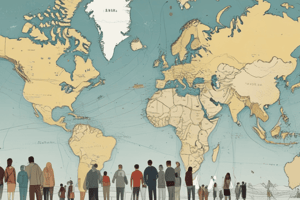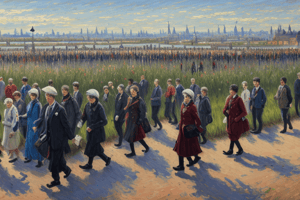Podcast
Questions and Answers
What is the main reason for the increase in net migration to the UK in recent years?
What is the main reason for the increase in net migration to the UK in recent years?
- Increase in available housing
- The decision to leave the European Union (correct)
- Expansion of the British Empire
- Britain's economic prosperity
Push factors encourage people to move to a new country.
Push factors encourage people to move to a new country.
False (B)
Name one pull factor attracting people to the UK.
Name one pull factor attracting people to the UK.
Good healthcare or educational opportunities
The movement of people from one country to another is known as ______.
The movement of people from one country to another is known as ______.
Match the historical event with its corresponding year:
Match the historical event with its corresponding year:
Which of the following is NOT a push factor for leaving the UK?
Which of the following is NOT a push factor for leaving the UK?
Many West Indians migrated to the UK between the 1950s and 1970s primarily for educational purposes.
Many West Indians migrated to the UK between the 1950s and 1970s primarily for educational purposes.
Which two regions do people from the UK often migrate to?
Which two regions do people from the UK often migrate to?
Refugees are individuals who flee persecution or ______.
Refugees are individuals who flee persecution or ______.
Which year marked the start of the significant arrival of Africans to the UK due to the slave trade?
Which year marked the start of the significant arrival of Africans to the UK due to the slave trade?
What happens when an asylum seeker's claim is allowed?
What happens when an asylum seeker's claim is allowed?
In which year did the UK hold a referendum to leave the EU?
In which year did the UK hold a referendum to leave the EU?
An asylum seeker can make a fresh claim if new evidence supporting their case comes to light.
An asylum seeker can make a fresh claim if new evidence supporting their case comes to light.
What factors contribute to an individual's identity?
What factors contribute to an individual's identity?
The net migration of EU nationals to the UK increased after the Brexit referendum.
The net migration of EU nationals to the UK increased after the Brexit referendum.
The ______ is responsible for deciding the outcomes of asylum claims.
The ______ is responsible for deciding the outcomes of asylum claims.
What percentage of non-EU nationals migrated to the UK in 2016 for study?
What percentage of non-EU nationals migrated to the UK in 2016 for study?
Match the following aspects of British identity with their descriptions:
Match the following aspects of British identity with their descriptions:
______ refers to the international movement of people into a destination country where they are not native.
______ refers to the international movement of people into a destination country where they are not native.
Which statement about British society is accurate?
Which statement about British society is accurate?
Match the following countries with their respective immigrant population in the UK according to the 2011 census:
Match the following countries with their respective immigrant population in the UK according to the 2011 census:
Which of the following is a benefit of immigration in the UK?
Which of the following is a benefit of immigration in the UK?
Younger generations tend to embrace a more tolerant and diverse society compared to older generations.
Younger generations tend to embrace a more tolerant and diverse society compared to older generations.
What is one way that applicants might be monitored after applying for asylum?
What is one way that applicants might be monitored after applying for asylum?
The UK Border Agency is responsible for making decisions on asylum and human rights claims.
The UK Border Agency is responsible for making decisions on asylum and human rights claims.
British tolerance, openness, and ______ define contemporary British society.
British tolerance, openness, and ______ define contemporary British society.
What are individuals called who are waiting for a decision on their asylum application?
What are individuals called who are waiting for a decision on their asylum application?
Match the following items with their relevance to culture:
Match the following items with their relevance to culture:
The ______ Convention Relating to the Status of Refugees was established in 1951.
The ______ Convention Relating to the Status of Refugees was established in 1951.
What significant event occurred in 2004 related to immigration in the UK?
What significant event occurred in 2004 related to immigration in the UK?
Flashcards
Net Migration (UK)
Net Migration (UK)
The difference between the number of people immigrating to and emigrating from the UK.
Push Factors
Push Factors
Reasons that make people leave a country, such as famine or lack of opportunities.
Pull Factors
Pull Factors
Reasons that attract people to a new country, such as job opportunities.
Brexit
Brexit
Signup and view all the flashcards
Asylum Seeker
Asylum Seeker
Signup and view all the flashcards
Refugee
Refugee
Signup and view all the flashcards
Geneva Convention
Geneva Convention
Signup and view all the flashcards
Immigration
Immigration
Signup and view all the flashcards
Emigration
Emigration
Signup and view all the flashcards
Brexodus
Brexodus
Signup and view all the flashcards
Positive Impacts of Immigration
Positive Impacts of Immigration
Signup and view all the flashcards
Negative Impacts of Immigration
Negative Impacts of Immigration
Signup and view all the flashcards
Multicultural Society
Multicultural Society
Signup and view all the flashcards
British Identity
British Identity
Signup and view all the flashcards
British Culture
British Culture
Signup and view all the flashcards
Components of Identity
Components of Identity
Signup and view all the flashcards
Components of British Culture
Components of British Culture
Signup and view all the flashcards
Asylum Application Process
Asylum Application Process
Signup and view all the flashcards
Top 10 Countries of Birth
Top 10 Countries of Birth
Signup and view all the flashcards
High Cost of Living
High Cost of Living
Signup and view all the flashcards
Impact of Brexit on Immigration
Impact of Brexit on Immigration
Signup and view all the flashcards
Study Notes
Immigration to the UK
- Net migration to the UK was +327,000 in 2016 and +246,000 in 2017.
- The UK's economy is the 5th biggest in the world.
- The UK's decision to leave the European Union (Brexit) appears to be impacting Europeans' views on coming to the UK.
Push and Pull Factors of Immigration
- Push Factors are reasons why people might leave their home country (emigration).
- Examples include famine, disease, lack of housing, and limited educational opportunities.
- Push factors of the UK are a high cost of living, bad weather, and a lack of affordable housing.
- Pull Factors are reasons why people might be attracted to live in another country (immigration).
- Examples include job opportunities, educational opportunities, and the presence of family or ethnic groups.
- Pull factors of the UK include strong human rights protection, safety, and good healthcare and education systems.
Timeline of Immigration to the UK
- 43-410AD: Romans invaded, bringing the first black people from North Africa.
- 1555-1833: African and Afro-Caribbean people arrived due to Britain's involvement in the slave trade.
- 1700s: Many Indians arrived due to the British Empire's expansion and trading routes.
- 1840: Thousands of Irish arrived to escape the potato famine in Ireland.
- 1946: Refugees arrived from Eastern Europe after World War II.
- 1950s-1970s: Many West Indians arrived seeking work and to help rebuild Britain after the war.
- 1973: Britain joined the EU, opening up migration from other EU member states.
- 2004: Migration from Europe increased due to the expansion of the EU to include many Eastern European countries.
- 2016: The UK held a referendum to leave the EU (Brexit), with 52% voting to leave.
Top 10 Countries of Birth for Immigrants in the UK (2011 Census)
- India: 722,000
- Poland: 654,000
- Pakistan: 502,000
- Ireland: 468,000
- Germany: 300,000
- China: 284,000
- Bangladesh: 214,000
- South Africa: 203,000
- Nigeria: 201,000
- United States: 197,000
Impact of Brexit on Immigration
- Net migration of EU nationals to the UK has dropped by 75,000 since the Brexit referendum, a phenomenon known as "Brexodus."
- Immigration from EU countries has fallen by another 50,000 since the referendum.
Positive Impacts of Immigration
- Immigration helps fill job vacancies and skill gaps in sectors like computing and dentistry.
- Sectors like health and social care rely on overseas-trained workers.
- Immigration encourages economic growth by providing young workers to fill job roles, pay taxes, and support the aging population.
Negative Impacts of Immigration
- A supply of cheap labor may lead to exploitation of workers and depressed wages.
- Large-scale migration can put strain on public services like schools and hospitals.
- The movement of people can cause community tensions and integration problems.
Asylum Seekers and Refugees
- Asylum seekers are individuals fleeing persecution in their home countries.
- Each country has its own process for verifying asylum applications.
- Granting asylum allows someone to remain in another country due to persecution risk.
- Asylum seekers are granted refugee status and protected legal rights if their application is successful.
International Laws Supporting Asylum Applications
- The 1951 Geneva Convention Relating to the Status of Refugees
- The 1950 European Convention on Human Rights
- The European Union Asylum Qualifications Directive
Asylum Application Process
- Screening Interview: Asylum seekers are given a refugee number.
- First Reporting Event: A Home Office case owner is assigned to the case.
- Substantive Interview: Asylum seekers present their case to the case owner.
- Regular Reporting Meetings: Applicants may be required to attend meetings with UK Border Agency staff. Some cases are reviewed through telephone reporting systems and electronic tagging.
- Claim Allowed: The asylum seeker is granted refugee status (5-year duration).
- Claim Refused: The asylum seeker is expected to leave the UK.
- Appeal Rights: Asylum seekers have the right to appeal a rejected claim to a first-tier tribunal. They can also make a fresh claim if new evidence surfaces.
British Identity and Culture
- The UK is a multicultural and multi-ethnic society.
- Tolerance, openness, and diversity define British society.
- Younger generations embrace diversity, while older generations are less accepting and may feel their cultural certainties are disappearing.
Components of Identity
- Politics
- Education
- Friends
- Work Colleagues
- Ethnicity
- Gender
- Sexuality
- Cultural Heritage
- Age
- Religion
- Family Traditions
- Social Background
- Job
Components of British Culture
- Origins and History of Britishness
- Social Status
- Language and Communication
- Family Life
- Beliefs and Practices
- Arts and Expressive Forms
- Food
- Recreational Leisure Activities
- Clothing Fashion
Studying That Suits You
Use AI to generate personalized quizzes and flashcards to suit your learning preferences.




